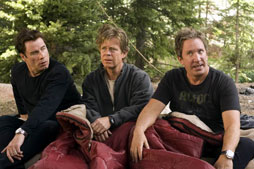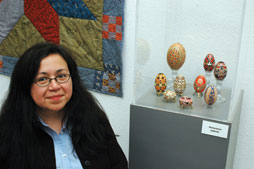By Isaiah Smith/entertainment editor
The Internet opens research possibilities for modern-day college students worldwide; however, the information gathered there can be shaky, unreliable and wrong.
“ The Internet is like a huge, eclectic library in which the books and magazines have been removed from the shelves and scattered on the floor,” Bill Holt, associate professor of English on South Campus, said.
“ The quality of the material ranges from excellent scholarship to completely insane ramblings,” he said.
Students should generally refer to their handbooks, or to Purdue University’s online resource library, both of which can help with evaluation and documentation of sources, Holt said.
“ To forbid the use of online sources seems unnecessarily restrictive,” he said.
“ But there are many traps on the Web that students and faculty must be aware of. The problems will undoubtedly get worse before they get better.”
Dr. Elizabeth Joseph, professor of English on SE Campus, forbids use of online sources altogether.
“ I do not let my students use dot-com sources because the information in those sources is unreliable and unscholarly,” she said. “I believe students are shortchanging themselves by the shortcuts they take in their education. American students are not spending enough time to find good scholarly sources … they try to get the briefest and easiest source available.”
Students do not evaluate their sources; they are becoming lazier than before, and the Internet has a lot to do with that attitude, Joseph said.
Still, with all that resounding criticism dominating the airwaves, proponents of Internet sources are sometimes drowned out despite having valid points.
“ College students of the 21st century are fortunate to study during a time in history in which information is conveniently and abundantly available,” Altheria Gaston Clark, instructor of English on South Campus, said. “It is unrealistic to think that students will not use the Internet as a learning tool.”
Restricting students from using online sources is somewhat foolish because most of the information is reliable and credible, Clark said.
“ Although I encourage my students to use the Internet as a research tool, I do offer them a caveat: Use Web sites discriminately,” she said. “Even though my students are allowed to use the Internet as a research tool, I also make them aware of more scholarly resources, such as databases, which contain articles from peer-reviewed journals.”
Jeanette Adkins, assistant professor of English on NE Campus, agreed with Clark.
“ Even though some information from Internet sources is incorrect and unreliable, the Internet serves as a wonderful tool for my students,” she said. “One of the things that I like most about the use of Internet sources is that a variety of information on given topics is accessible to my students.”
Adkins added, “With a multiplicity of Web site information comes a greater understanding of, and appreciation for, the subject matter taught in class.”
The vast knowledge gained from Internet sources widens student horizons and makes them better, more well-rounded individuals, Adkins said.
Holt highlighted what he considers the main problems with Internet sources.
“ Four problems many students have difficulty coping with are resisting the appeal of the multitude of online paper mills, sorting good from bad sources, documenting material properly and ignoring some of the best sources because they are available only in hard copy in the library,” he said.
The electronic age of information is only growing in popularity. In 1996 there were 10,000 scholarly databases online, and now they exceed 18,000. Yet, with the Web teeming with more than 100 million sites, it is easy for students to miss those 18,000 scholarly databases.
Which Web site is chosen for a project may seem like no big deal, but a Bangor Daily News article points out the fine line students are walking. For example, a report on the Ku Klux Klan might lead a student to the Smithsonian archives or to a site maintained by a racist group, the article said.
“ Wikipedia is a user-driven encyclopedia. In other words, anyone can put anything on it; hence, its reliability is suspect at best,” Anne M. Drake, coordinator of the learning center on NE Campus, said. “The most basic problem of using the Internet for research is the same: anyone can place anything on there.”
Sadly, very few students are willing to go the extra mile and take the time to do that evaluation and fact-check, Drake said.
“ [Students should] evaluate the source … and also try to back up the information they get with something from the TCC databases or print sources,” she said.
Regardless of students’ proper or improper use of the Internet as a resource, it is improbable to think that, with the way technology is developing, online sources will be rejected for very long.





























